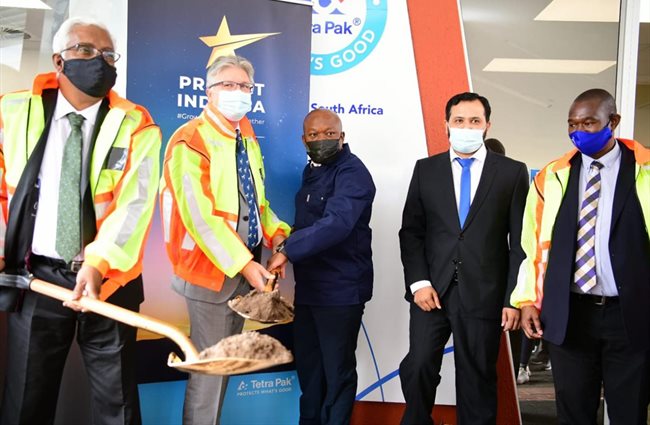
Tetra Pak stated that the investment reinforces its commitment to the growth and success of the local operation, and added that it's and is a testament to the company’s vision “Make food safe and available, everywhere”.
According to the company, the announced plant upgrade will add many benefits to many sectors in the liquid food industry value chain:
• The upgrade will increase Tetra Pak’s production capacity allowing it to extend its reach to serve more customers in the southern African region.
• The Pinetown plant will be a production hub for all Southern Africa and this expansion will create direct and indirect job opportunities through suppliers in the region
• The new packaging technology will produce less CO2 emissions by using less energy and water in processing, as well as using alternative, green sources of electricity.
• It will allow the production of the latest packaging formats using state-of-the-art technology
Waqas Ali, factory director at Tetra Pak South Africa’s Pinetown plant commented: “The upgrade will enable an increase to 80% in local content. This will not only assist the local supply chain but lead times for delivery to clients will also fall considerably – in some cases dramatically. Clients will additionally benefit from far greater agile and responsive in our processes. With new state-of-the-art plant, should a customer need to respond to market changes, we will in future be able to deliver a quick turnaround.”
The announcement was made at a recent formal celebration attended by the KwaZulu-Natal Premier, Honourable Sihle Zikalala; MEC of Economic Development, Tourism and Environment, Honourable Ravi Pillay; and the Chief Whip of eThekwini Municipality, Cllr Sibongiseni Mkhize.
Premier Sihle Zikalala of the KwaZulu-Natal provincial government said: “This investment is a vote of confidence by the Tetra Pak group in the resilience and resurgence of the economy of KwaZulu-Natal following the Covid-19 pandemic and related socio-economic challenges. Critically, this confirms Tetra Pak's long-term commitment to KwaZulu-Natal, and it taps South Africa as a key manufacturing hub with the capacity in infrastructure and skills to serve all the Southern Africa markets.
“We welcome this injection of half a billion rand into our economy which will certainly foster economic growth and boost much-needed jobs in the province”.
Stefan Fageräng, managing director of Tetra Pak South Africa commented: “While the investment is primarily a business decision, it cannot be ignored that it also represents a timeous morale booster in the KwaZulu-Natal province and in South Africa. In addition to benefiting our customers, upgrading our Pinetown plant presents numerous possibilities for the communities around us. This investment will have a positive impact on local farming communities, suppliers of raw material, and the services in the local community.”
Fageräng added, “Tetra Pak has stepped up its investment and innovation efforts, joining forces across the board to address the need for greater consumption of food while reducing the impact on natural resources. In South Africa, we are committed to play our part in making food systems more secure and sustainable.
“Together with our customers, partners, NGOs and the government, we want to address three key challenges; access to safe and nutritious food, reduce food and water loss and build a sustainable food value chain. We see this investment as a big step in that direction.”
Globally, Tetra Pak intends to be carbon neutral by 2030 and has the ambition to launch the world’s most sustainable package made from renewable materials. “By making this investment in South Africa we are making it possible to produce these breakthrough products locally and to ensure that they get recycled and reused, as part of the circular economy. It will also bring closer the possibility of using sugarcane as a raw material for biobased plastic material, which we hope will soon be locally produced,” Fageräng said.
He concluded, “Following the successful launch of our Go nature. Go carton. (GNGC) positioning campaign last year, we're amplifying our efforts further with our second phase (GNGC 2.0). Last year we built a solid foundation and established our position in the market featuring our journey towards the world's most sustainable food package. This year we are unfolding the chapters in the circular model, focusing on the recycling chapter, and highlighting our initiatives along the recycling value chain.”